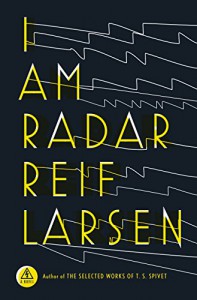Currently reading
Eleven
A Month in the Country
A Tale of the Dispossessed: A Novel
Mesabi Pioneers
The Crusades Through Arab Eyes
Island of a Thousand Mirrors
I Am Radar: A Novel
 I got this from Penguin's First to Read program.
I got this from Penguin's First to Read program. Larsen's telling of the early life of Radar Radmanovic is part historical fiction, part science fiction, and it's beautiful, intricate, and messy. It centers on the performance artistry of a small troupe based in northern Norway, nearly at the Russian border. Its five parts tell of the unlikely interweaving of this troupe and its members, which ultimately include Radar himself. Parts 1, 3, and 5 tell Radar's story. Sections 2 and 4 are beautiful, in many ways my favorite parts, but, truth be told, they could be lifted clean out of the novel and it would still hold together well. Part 2 tells the story of Miroslav Danilovic, a man who grows up in the last part of the 20th century in Bosnia (Visegrad), and the section is a lovely tale of historical fiction, as lovely as a tale of a family in wartime can be that would be a great little novella on its own. Part 4 is about the family and life of Raksmey Raksmey, a man of uncertain birth who grows up in Cambodia in the latter half of the 20th century, and improbably becomes a particle physicist. Again, it could be lifted out of the novel, but it makes the novel all the richer.
And then there is Radar, of Serbian heritage and from New Jersey, and his adventure to the Democratic Republic of Congo in part 5. Altogether, we get a tour of several parts of the world, linked by puppetry, ambitious artistry fed by genius and almost always doomed, and histories of conflict and injustice. It's a sweeping tale which, in the end, is purposely unfinished.
I do have to say that enjoying this book requires a great deal of suspension of disbelief. The connections and happenings are incredibly unlikely. But the hard part, for me, was the science. There are quite a few references to physics, and especially quantum physics, that are poetic but based on nothing even approaching science. The idea of quantum entanglement comes up, and is actually a wonderful metaphor for the relationships in the book, but only if you use the poetic interpretation the author uses -- he seems to have heard of the term but understood nothing of it. That's hard for me to get over. But if you can get past the bad science and live in the poetry, it's rewarding.









